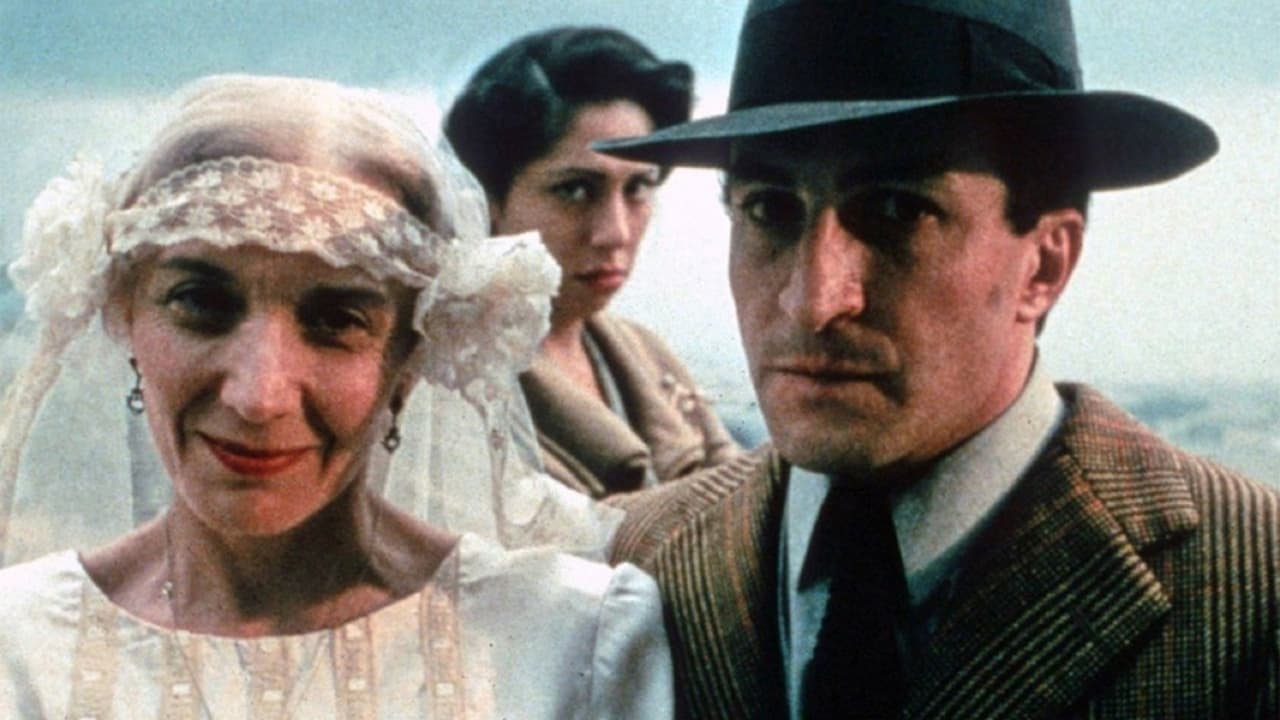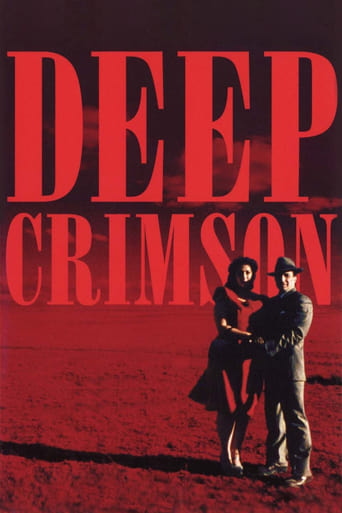TrueHello
Fun premise, good actors, bad writing. This film seemed to have potential at the beginning but it quickly devolves into a trite action film. Ultimately it's very boring.
AnhartLinkin
This story has more twists and turns than a second-rate soap opera.
Humaira Grant
It’s not bad or unwatchable but despite the amplitude of the spectacle, the end result is underwhelming.
Nayan Gough
A great movie, one of the best of this year. There was a bit of confusion at one point in the plot, but nothing serious.
billcr12
This is a remake of the Honeymoon Killers from 1969. Raymond Fernandez and Martha Beck were a couple who were a perfectly matched couple. They met through a lonely hearts club and it was kismet. Ray was able to seduce lonely older women and brought along Martha posing as his sister. The American version is better, with a Smiling young Tony LoBianco as Ray and Shirley Stoler as Martha. The Mexican version also features fine actors and it is a decent remake. The true story is amazing and viewers should read it before seeing the films based on the tale. Deep Crimson has a made up ending, but it works anyway. The true story ended in my childhood hometown of Ossining NY. I do recommend it to fellow true crime aficionados.
Ciara Calleja
Deep Crimson is so much more than a partner-crime movie. Of course there is the typical troubled couple that is pulled together with a goal of being together and getting rich, but to not leave it at that is what differs it from the American cliché of "Bonny and Clyde." The main characters Nicolas and Coral are terrific failures that make the audience almost want to pity them; they aren't perfect in looks, brains, skills, or anything really. Because of this, the movie presents issues of envy, vanity, greed, lust, wrath, gluttony, sloth within Nicolas and Coral alone. In other words, the characters of Nicolas and Coral are a perfect example of the seven deadly sins.We see can see envy, gluttony, and sloth from Coral. She is constantly resorting to food, stuffing herself to stuff down her emotions, a typical sign of gluttony. This of course sets in with Coral's laziness, or sloth, she claims that she could easily loose the weight if she wasn't so lazy, when she first meets Nicolas. Because of her attitude on her weight and appearance, she easily grows jealous toward other woman that Nicolas tries to seduce in their "work," envying their position and looks. Vanity and wrath are perfectly displayed by Nicolas; this of course is all resorted toward his wig. Once the wig is on he is a seducer, claiming that he can only work on "his looks," and the wig is the launching point for this vain stand-point. However, once a woman discovers that he has a wig he becomes fueled with anger and usually lashes out to the woman that has discovered his secret. Both characters are driven by the sins of greed and sexual lust. Their entire motive is driven toward the greed of financial gain, to steel from woman that Nicolas attempts to seduce. However the two are driven by sexual lust, like the lust that Coral has toward Nicolas, or the trouble that Nicolas' lust has toward other woman he seduces. Because of this, the sins the two commit, the audience realizes that they must die. As Coral says moments before she is shot to death, "I think this is the happiest day of my life." Making the ending one that is satisfying to the audience and the characters themselves.
groggo
Arturo Ripstein has long been known as a brilliant film director, and he shows us why in Profundo Carmesi (Deep Crimson).In this 1996 film, Ripstein, in collaboration with writer Paz Alicia Garciadiego, makes us feel uneasy and uncomfortable, largely because he concentrates on two deeply flawed characters who are exaggerated versions of ourselves. There is a pattern here that is basic to art: the identification of ourselves in characters who should be, if logic holds, dismissed as too repulsive by half. Unless you live in a permanent Happy Sunshine Camp, all of us share the two characters' traits to one degree or another: jealousy, fantasy, yearning, self-absorption, greed, loneliness, desperation; the list goes on. The big difference is that most of us don't yield completely to our obsessions and allow them to overtake and ultimately destroy us. The lead players in this film (set in late-1940s Mexico) are Coral (Regina Orozco), an obese nurse, dreamer and part-time embalmer who yearns for Happiness Ever After with the most masculine of heroes, and Nicolas (Daniel Gimenez Cacho), a two-bit swindler and self-styled 'ladies' man' who exploits vulnerable, lonely women for sex and profit through lonely-hearts ads. Nicolas is, in other words, the opposite of what Coral believes she needs to 'complete' her life, yet she falls hopelessly in love with him. But it's not love at all, but a dreamworld of folly; neither of these characters has the faintest idea what love is. Despite their repellent behaviour, they are not without viewer sympathy -- they are more delusional and sadly deranged than anything else. In other words, they're very human, and that's the key in this film: we don't want to watch these pathetic creatures, but we do. Ripstein knows that if we look too closely we can see familiar (and unpleasant) pieces of ourselves. This is based on a true story, and once again I'm left to repeat those famous words: you couldn't make this stuff up. Art imitates life to be sure.The photography (by Guillermo Granillo) is stunning in a 'washed-out' reddish tinge that complements its authentic 1940s 'feel'. David Mansfield's music (a repetitive piano riff) is haunting and adds a perfect tone to the film. The acting is first-rate, especially by Cacho as the whining, migraine-ridden manipulator who is so neurotically attached to his hairpiece that he never wants Coral to see him without it.The only real failing in this film for me is background. These are two really undesirable characters, but we don't know how they got that way. In the summing up, it doesn't really matter. This is a riveting, fascinating film from beginning to end.
ThurstonHunger
I've heard (positive things) about Arturo Ripstein before, but this is his first film I've seen. If this is one of his masterpieces, then it will likely be my last. The film is nearly as despicable as the two characters featured in it.I'll confess I'm no fan of true crime, but I'm the victim here, not the culprit. Additionally any film "based on a true story" is generally suspect. Horrendous acting, and peculiar pacing are only some of the glaring crimes. Vaguely you could make the case for this being about gluttony and vanity, or that Ripstein breaks with "Hollywood" conventions by having an actors and actresses with unconventional faces...but those conventions have been shattered properly many times with films far more engaging or entertaining than this.Potential spoilers follow, but the film is already spoiled enough and anything but profound, although definitely steeped in crimson blood. Please see something from one of the other films I've reviewed positively here.***light spoilers***What is the point of having Coral toy with redemption in the last of the crimes in their murder spree? She has already been set up as extremely unsympathetic from the first few scenes, leading up to the one with her own daughter and son, thus the scene with a replacement "daughter" just doesn't wash at all. The blood has soaked through and through...Again by having his lead characters so horrendous, Ripstein takes any force out of the foibles displayed by the other characters. We feel awkwardly sorry for some of the targets, but they too are generally given a grotesque caricature. Above I mentioned the obvious gluttony (Coral) and vanity (Nicolas), other characters do bring in lasciviousness, false piety and things that vaguely echoed the seven deadly sins, but this film just did not work on any level for me. Odd stabs at humor seemed woefully out of place, and added only a sense of insolence to injury.Okay, maybe for the lighting I'll give this a1/10

